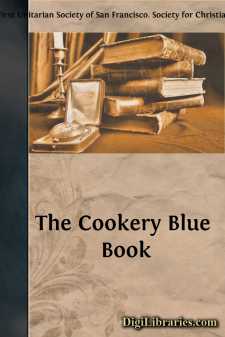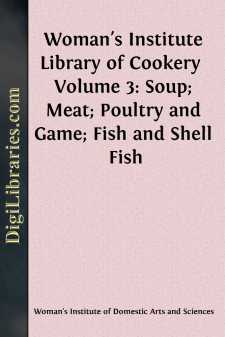Cooking
- General 70
- History 1
- Reference 10
- Regional & Ethnic 3
- Vegetarian 10
Cooking Books
Sort by:
CHAPTER I. THE MISTRESS. "Strength, and honour are her clothing; and she shall rejoice in time to come. She openeth her mouth with wisdom; and in her tongue is the law of kindness. She looketh well to the ways of her household; and eateth not the bread of idleness. Her children arise up, and call her blessed; her husband also, and he praiseth her."вÐâProverbs, xxxi. 25-28. I. AS WITH...
more...
by:
Anonymous
Medicines made of Lemmons. To take away the Spots, or red Pimpels of the face. Take halfe a pint of raine water, and halfe a pint of good Verjuice, seeth it till it be halfe consumed, then whilst it boils fill it up againe with juyce of Lemmon, and so let it seeth a pretty while; then take it from the fire, and when it is cold put to it the whites of four new laid Eggs, well beaten, and with this water...
more...
REMARKS ON BREAKFAST COOKERY. "Dinner may be pleasant, So may social tea;But yet methinks the breakfast Is best of all the three." The importance of preparing a variety of dainty dishes for the breakfast table is but lightly considered by many who can afford luxuries, quite as much as by those who little dream of the delightful, palate-pleasing compounds made from "unconsidered...
more...
SOUPS. Bouillon Soup. 4 pounds of round of beef cut into dice pieces. Trim off all fatty skin. 4 quarts water; 1 teaspoonful celery seed; 4 large onions; 6 large carrots; bunch of parsley; 6 blades of mace; 16 whole cloves, salt and pepper to taste. Pour on the water, and let it simmer six hours, skimming carefully, for if any grease is allowed to go back into the soup it is impossible to make it...
more...
GENERAL DIRECTIONS. "Do you teach your pupils how to carve?" "Please give us a lecture on carving; my husband says he will come if you will." I have been so frequently addressed in this way that I have decided to publish a manual on the Art of Carving. Instruction in this art cannot be given at a lecture with any profit to my pupils or satisfaction to myself. One cannot learn by simply...
more...
by:
Various
PREFACE The recipes in this little book have been sent by Belgian refugees from all parts of the United Kingdom, and it is through the kindness of these correspondents that I have been able to compile it. It is thought, also, that British cooking may benefit by the study of Belgian dishes. The perfect cook, like Mrs. 'Arris or the fourth dimension, is often heard of, but never actually found, so...
more...
VALUE OF SOUP 1. SOUP is a liquid food that is prepared by boiling meat or vegetables, or both, in water and then seasoning and sometimes thickening the liquid that is produced. It is usually served as the first course of a dinner, but it is often included in a light meal, such as luncheon. While some persons regard the making of soup as difficult, nothing is easier when one knows just what is required...
more...
PREFACE. Among the multitudes of causes which concur to impair health and produce disease, the most general is the improper quality of our food: this most frequently arises from the injudicious manner in which it is prepared: yet strange, “passing strange,” this is the only one for which a remedy has not been sought; few persons bestow half so much attention on the preservation of their own health,...
more...
by:
Juliet Corson
The wide publicity which the press in different sections of the country has given to my offer to show workingpeople earning a dollar and a half, or less, per day, how to get a good dinner for fifteen cents, has brought me a great many letters from those who earn more, and can consequently afford a more extended diet. In response to their requirements I have written this book, which I hope will be found...
more...
SAVE WHEAT Reasons Why Our Government Asks Us to Save Wheat, with Practical Recipes for the Use of Other Grains A slice of bread seems an unimportant thing. Yet one good-sized slice of bread weighs an ounce. It contains almost three-fourths of an ounce of flour. If every one of the country's 20,000,000 homes wastes on the average only one such slice of bread a day, the country is throwing away...
more...











